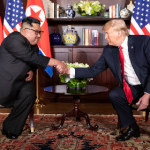U.S. President Donald Trump and North Korean leader Kim Jong Un’s summit at Singapore may have been astonishing in the unconventional way it was conducted, but may be more productive in outcome than others.
Whether by design or not, immediately after the talks, Trump announced casually that he was calling off the ongoing joint military exercises with South Korea because they cost a lot and are very provocative.
This is the crux of the matter, a recognition that in a changed global scenario, the writ of the United States no longer runs even though it continues to be militarily the most powerful country in the world. Why should North Korea, constantly assessed as a paranoid, dictatorial regime, surrender its nuclear weapons — its only defence against assured destruction — unless the security guarantees offered by America are iron-clad? Pyongyang will surely have measured the trade-off against the recent debacles – Trump’s rejection of the JCPOA for Iran, and his predecessors enabling the regime change and assassinations of Gaddafi in Libya and Saddam Hussein in Iraq.
The promise of only two military actions will have been reassuring for North Korea: one, the curtailment of the military exercises; two, a subsequent drawdown of U.S. forces stationed in South Korea. These, along with the easing of economic sanctions, calibrated with North Korea’s steps to disable its nuclear and missile infrastructure, will have come as reassurance for both Pyongyang and its protector, Beijing. Already, China has resumed some trading activity with North Korea, including the supply of petrol and purchase of seafood.
All countries have welcomed the agreement including South Korea, whose President Moon has been the facilitator for the summit and has genuinely committed to a North-South rapprochement. In fact, he had been hesitant about the U.S. missile defence deployment in South Korea. But even he seems to have been blindsided by Trump’s announcement regarding halting of the ongoing joint military exercises with U.S. and South Korean forces.
As the summit became more probable, Russia dealt itself back into the game by the visit of its Foreign Minister, Sergei Lavrov, to Pyongyang May 31, 2018, and by calling for the resumption of the Six-Party Denuclearisation Talks, abandoned since 2009. India is back in the game too: by sending its Minister of State, Gen V.K. Singh, to Pyongyang in May 2016, it was reminding the world that it has had an embassy there since 1973 and been North Korea’s third largest trade partner. India’s concerns about the Pakistan-North Korea missile-nuclear technology nexus are long-standing and will certainly be ameliorated with the denuclearisation of North Korea as well as the halting of its missile testing programme. South Korean President Moon will visit New Delhi next month to brief us on the rapidly changing scenario.
There is no evidence that Trump took up Japanese concerns regarding its citizens abducted by North Korea. While that is an emotional issue, Japan has real security concerns regarding the short-range missiles in North Korea’s arsenal, which target Tokyo. It is also concerned that the resolution of differences between the U.S. and North Korea will augment Chinese influence over North Korea, as shown by the two quick visits Kim Jong Un made to consult President Xi before the summit in Singapore.
Trump, by not making maximalist demands at the Singapore summit, might achieve something instead of the nothing by previous U.S. administrations, led by George Bush and Barack Obama, with their imperious demands for capitulation. Both had declared that a summit could only follow “Complete Verifiable Irreversible Denuclearisation”. How was that ever realisable from an allegedly paranoid isolated regime with sophisticated nuclear and missile capabilities?
The realism reflected in the give-and-take that characterised this summit — rather than the previous all-or-nothing positions — may enable the U.S. to move ahead on other contentious issues.
Neelam Deo is Director, Gateway House.
This article was exclusively written for Gateway House: Indian Council on Global Relations. You can read more exclusive content here.
For interview requests with the author, or for permission to republish, please contact outreach@gatewayhouse.in or 022 22023371.
© Copyright 2018 Gateway House: Indian Council on Global Relations. All rights reserved. Any unauthorized copying or reproduction is strictly prohibited.
Podcast: Play in new window | Download
Subscribe: Apple Podcasts | Email | RSS



